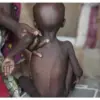The World Health Organization (WHO) launched a new platform on Tuesday aimed at providing free cancer medicines to thousands of children in low- and middle-income countries, in a bid to address the disparities in childhood cancer survival rates.
The first shipments of medicine are being delivered to Mongolia and Uzbekistan, with additional shipments planned for Ecuador, Jordan, Nepal, and Zambia as part of the platform’s pilot phase. These treatments are expected to reach approximately 5,000 children this year, across at least 30 hospitals in the six countries.
“Countries participating in the pilot phase will receive a consistent, uninterrupted supply of high-quality childhood cancer medicines, completely free of charge,” the WHO stated.
Currently, childhood cancer survival rates in low- and middle-income countries are often below 30 percent, compared to about 80 percent in high-income nations.
“For far too long, children with cancer in these countries have lacked access to life-saving treatments,” said WHO Director-General Dr. Tedros Adhanom Ghebreyesus.
In addition to the six countries in the pilot phase, a further six nations have been invited to join the initiative. The platform aims to expand to 50 countries over the next five to seven years, ultimately providing medicines for an estimated 120,000 children with cancer.
The WHO reports that approximately 400,000 children worldwide are diagnosed with cancer each year, the majority of whom live in resource-constrained settings. Tragically, around 70 percent of children in these environments die from cancer due to factors like inadequate treatment, treatment interruptions, and low-quality medicines.
The WHO emphasized that the provision of cost-free medicines will continue beyond the pilot phase, with plans for long-term sustainability already in development.
The platform, first announced in December 2021, is a collaborative effort between the WHO and St. Jude Children’s Research Hospital in Memphis, Tennessee. The nonprofit pediatric treatment and research center has committed $200 million to help fund the initiative.
AFP


